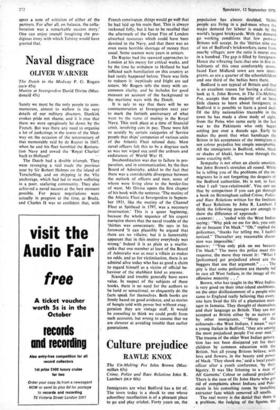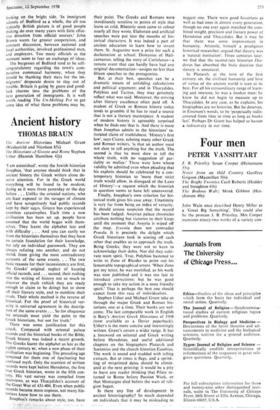Culture prejudice
RAWLE KNOX
The Un-Melting Pot John Brown (Mac- millan 65s) Crime, Police and Race Relations John R. Lambert (oup 60s)
Immigrants are what Bedford has a lot of. The town today is a shock to one whose schoolboy recollection is of a pleasant place to go and play cricket. Forty years on, the
population has almost doubled; 70,000 people are living in a pad-mass where the major demand for labour is made by the world's largest brickyards. With the demand go working conditions that few postwar Britons will accept. In the 'thirties nine out of ten of Bedford's brickworkers came from nearby villages; now the ratio is nearer one in a hundred. The gap is filled by foreigners. Hence the vibrating facts that one in five in- habitants of this once comfortably moon- faced East Midland town are now immi- grants, as are a quarter of the schoolchildren and one third of the babies born there.
Bedford is not typical of Britain and that is an excellent reason for having a clinical look at it. John Brown, in The Un-Melting Pot, accepts that the majority of us have little chance to learn about foreigners; in Bedford it is possible to learn a good deal. Of the fifty nationalities traceable in the town he has made a close study of eight. from the Poles who came early in the last war to the Pakistanis who only began settling just over a decade ago. Early he makes the point that what handicaps the Briton in his acceptance of the immigrant is not colour prejudice but simple xenophobia. All the immigrants in Bedford, white, black or shades of khaki, have been through the same exacting mill.
Sympathy is not often an elastic emotion, but John Brown's stretches all round. While he is telling you of the problems of the im- migrants he is not forgetting the despairs of the Bedford authorities. He is not, in fact, what I call `race-relationsisif. You can see that by comparison if you can get through a book on Birmingham called Crime, Police, and Race Relations written for the Institute of Race Relations by John R. Lambert. I think the following passages are enough to show the difference of approach: LAMBERT; . . . 'ended with the West Indian saying : "Why pick on me for this, you only do so because I'm black." "Oh," replied the policeman, "thanks for telling me, I hadn't noticed." Thereafter any reasonable discus- sion was impossible.'
BROWN: "'You only pick on me because I'm black." The more the police meet this response, the more they resent it: "What I [policeman] get prejudiced about are the buggers that use that argument." . . . The pity is that some policemen are thereby led to cast all West Indians in the image of the offensive minority , Brown, who has taught in the West Indies, is very good on their inter-island snobbisms, on the utter disillusionment of, a people who came to England really believing that every- one here lived the life of a plantation man- ager in Jamaica. They thought of themselves and their language as British. They are not accepted as British either by us natives or by other immigrants. "'Many of the coloureds—the West Indians, I mean." says a young Italian in Bedford, "they are among the most prejudiced people I've ever met."' The trauma of the older West Indian genera- tion has not been dissipated yet for their children by common education with the British. Not all young. Britons believe, with love and flowers, in the beauty and power of black. 'They shook me,' said a local youth officer after a youth conference,. `by their bigotry. It was like listening to a race of Alf Garnetts.' Colour or cultural prejudice? There is the case of Dr John Harte who got rid of complaints about Indians and Paki- stanis in his consulting room by installing extractor fans which removed all smells.
The real worry is the denial that there is a problem, the fudging of the figures, the
looking on the bright side. 'In immigrant schools of Bedford as a whole, the all too typically British picture is of good people making do over many years with little effec- tive direction from. official sources.' John Brown wants far greater cooperation, and constant discussion, between national and local authorities, involved professional men, and employers. Too many officials at the moment seem to fear an exchange of ideas.
The burgesses of Bedford tend to be self- congratulatory regarding the town's com- parative communal harmony, when they should be thanking their stars for the im- migrants' desperate desire to stay out of trouble. Britain is going by guess and good- luck charms into the problems of the next generation of immigrants. It is well worth reading The Un-Melting Pot to get some idea of what those problems may be,















































 Previous page
Previous page